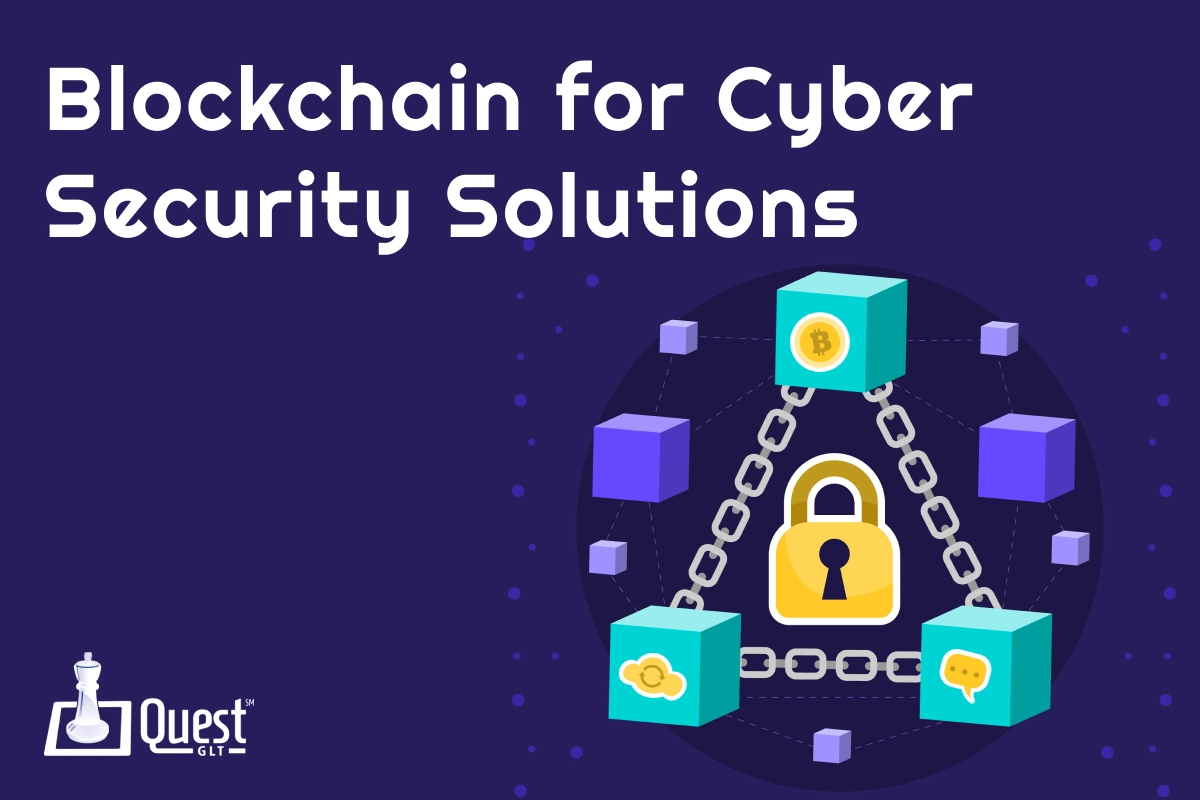
In today's modern digital environment, cybersecurity is becoming more vital. The threat of cyberattacks has increased dramatically as our dependence on technology and the internet has grown. Consequently, diverse solutions such as the use of blockchain technology, have been developed to help protect against these susceptibilities. Blockchain technology originally occurred as the foundation for Bitcoin, but its conceivable benefits have already expanded well beyond the realm of finance. Blockchain technology is increasingly being utilised to improve cybersecurity.
When managing your networks and applications security is one of the first things to invest in. The nature of ransomware and online hazards has developed in tandem with technology, making it extremely essential to utilise the most recent best practices to protect our devices and networks. Despite our actions to protect the integrity of our cybersecurity systems, fraudsters continue to develop new ways to access our networks for harmful intentions.
With the worrisome increase in threats, the demand for impermeable security is rising enormously. This is why numerous businesses are choosing to invest in Blockchain for Cyber Security Solutions.
This technology has particular features that make it ideal for data protection and cyberattack deterrence. For instance, it cannot be controlled by a single entity because blockchain is decentralised, making it slightly effortless to attack. Moreover, due to the use of cryptographic methods and digital signatures, data stored on a blockchain is extremely secure and tamper-resistant.
In this blog, we will discuss blockchain security, work it works, and various ways used to protect data and control cyberattacks. Additionally, types, functioning processes, and leveraging blockchain for cyber security solutions, its influence and its history.
So, without any delay, let’s begin!
What is Blockchain Security?
Blockchain security is a sophisticated kind of cybersecurity that benefits millions of users globally by storing data, protecting confidential files, and improving network and data security through its connected network. Blockchain and cybersecurity are entirely consistent as these formats can only be accessed by official users via digital signatures. By storing their data safely behind a cybersecurity blockchain wall, individuals and businesses alike may benefit from a higher degree of protection from cybercrime hackers.
Blockchain security is exceptionally universal. Many enterprises want to invest in blockchain cybersecurity as it can hold any form of data. That signifies it may be used to rescue tactful data such as medical records, credit card purchases and other financial transactions, confidential agreements, and so on. Since its inspection in 2008, blockchain security has developed to become today’s one of the most trustworthy and dependable – blockchain for cyber security solutions.
How Are Data Updates Made And Blockchains Developed?
As the term implies, blockchain security operates via chains — storing blocks containing individuals' confidential data. Why blockchain is so secure? Through a complex technique, individuals can add these blocks to the chain. Blockchain innovation in cybersecurity tackles complex mathematics difficulties. Customers may resolve these problems using their cutting-edge frameworks, which offer important methods to complete tasks. By using this advanced way, users obtain access to blockchain cybersecurity's virtually impregnable and solid walls.
For users to add more data to the blockchain security features, they need to develop a chain of code that functions as one block of data on top of the next. Blockchain in cybersecurity necessitates one of the most methodical and precise techniques of updating as even a minor change can disrupt the whole chain. Blockchain cybersecurity, however, also eliminates data loss by closely monitoring all alterations and contrasting the new to old versions.
Is There No Threat in Blockchain?
Hackers target blockchain applications in four basic ways:
Routing Attacks
Whenever you make use of the internet, you are susceptible to routing attacks. This is why cyber attackers carry out their nefarious goals by grabbing the data transmitted via internet services. This might be difficult to address or even identify because, at first look, this seems difficult to identify and everything is normal. In reality, though, hackers have already obtained access to your confidential data.
Sybil Attacks.
Cybercriminals use Sybil attacks to flood networks with phoney identities. A huge number of these identities will ultimately overwhelm blockchain security's ability to work effectively, preventing authorised individuals from accessing the chain. The system will eventually fail due to the pressure, leaving the chain and all of its data open to hackers. There is currently no known solution to this threat.
Phishing Attacks
This is one of the renowned and frequent attracts in blockchain security today. Cybercriminals and hackers use hacking to trick susceptible users into disclosing their confidential information and credentials through bogus emails. These emails impersonate messages from a trusted or recognised party and target major stakeholders by providing them with false hyperlinks. When users click on these links, their data is collected and exploited to obtain access to their blockchain security.
51% of Attacks
51% of threats require large-scale operations with a huge amount of resources. It takes plenty of attempts on the attacker’s aspect, but in return, they obtain more than half of the blockchain security’s mining power. With such a huge scope of control, cybercriminals have a plethora of options for exploiting hacked data. One of the most prevalent ways hackers exploit this is to reverse transactions.
While blockchain remains vulnerable to some attacks, the benefits of using it in cybersecurity outweigh the dangers.
Blockchain Technology’s Benefits for CyberSecurity
Blockchain security provides significant benefits to its users in terms of security and peace of mind. Here are some:
Decentralised Medium Storage Systems
For many businesses, blockchain cybersecurity is slowly becoming the new standard. Traditionally, businesses employ centralised medium storage systems, making their networks vulnerable to hackers. To gain access to important information, cyber hackers only need to uncover one weak point in their security. Blockchain security combats this by requiring a decentralised storage system, making it harder for attackers to identify susceptible locations that allow them to bypass blockchain protection.
Encrypted Private Communications
Blockchain security might also be used on the social media networks you use daily. With the ease of instant messaging and a wide range of messaging software, private messaging has emerged as one of the most popular ways of communication. However, these programmes are exposed to risks if hackers obtain access to the sensitive information supplied by users via messaging. Blockchain security stops this from happening by establishing a consistent security protocol for greater protection.
Stopping Fraudulent Activities and Data Alteration
Blocking meticulous fraud activity or data manipulation is one of the main purposes of blockchain security. Unlike traditional networks and operating frameworks, blockchain cybersecurity is secured by the fact that corrupting its chain requires extremely sophisticated and elaborate methods. Cybercriminals will be unable to erase or tamper with any data unless they get access to and wipe out all machines owned by the chain's authorised users.
IoT Security
The decentralized storage systems of blockchain security have once again become useful in IoT security. With the growing popularity of artificial intelligence systems that offer a centralized and automated function for devices, attackers may primarily breach these devices’ systems and acquire complete control of their features by engaging AI. Blockchain cybersecurity prevents this from happening by enabling the system to make security decisions on its own. Blockchain security's decentralised approach to storage systems reduces, if not eliminates, the possibility of the entire system being hacked as soon as cyber thieves acquire access.
Protect DNS and DDoS
DDoS and DNS work together to keep a website or application running. Once compromised by hackers, the platform or application in question will most likely begin to slow down or possibly shut down altogether, causing downtime and delays for your firm. Worse, fraudsters may take advantage of this chance to get access to your platform and modify its content. In turn, your website or application may be exploited for harmful objectives such as stealing money from innocent customers, forwarding material to a different malicious website, or altogether barring access for its legitimate owners.
Cyber-Physical Infrastructure Verification
The prevalence of cybercrime and data tampering concerns puts cyber-physical system integrity in danger. Blockchain security addresses this issue by checking and closely tracking the status of all cyber systems and infrastructures. Consequently, users may be certain that any information contributed to the chain is genuine and devoid of malicious intent that might destroy the entire network.
Protect Data Transfer
When data is transferred from one location to another, it is automatically exposed to cybercriminals who want to intercept it on its journey to the recipient. Blockchain security provides absolute encryption for all data that travels across its network, guaranteeing that it is not compromised at each step. This is one of the most important actions you can take while working with blockchain cybersecurity. It's impossible to predict what thieves will do with your data once they get it. There are limitless threats that can only be overcome by battling them with the best protection possible.
Reduce the Risk of Human Error-Based Cyberattacks
In most cases, the issue does not lie with the network, but with the users who maintain it. Due to its automated aspects, blockchain security requires minimum human intervention. Having said that, it can work independently as a dependable and fully functional system for storing your data. As it can essentially operate on its own, it eliminates the need for users to manage its performance and minimises the likelihood of errors occurring during the process. At the same time, individuals may watch the chain at any moment and intervene if suspicious activity happens.
Blockchain Cybersecurity’s Future Trends
Future has in store, upgrading the problem-solving ability and more advanced technology in conformity to the continuously changing threat environment and technology itself. undefined
1. Artificial Intelligence Integration:
Using blockchain along with AI is anticipated to enhance the power of cybersecurity considerably. Artificial intelligence algorithms can use blockchain technology for big dataset research and, in a proactive way, detect and respond to cyber threats.
2. Security Models with Zero-Trust:
The design of blockchain which is decentralised and trustless perfectly fits into no-trust security principles. The filtering mechanism is the future of cybersecurity tactics and it will ask for verification from all connections of the network so that fraudulent entities will lose chance.
3. Interoperability and Standardization:
With the enhanced usage of blockchain apps, the need for interoperability & standards will keep growing. In the future, attention should be paid to elaborating common standards that will enable multiple blockchain networks to join and share data between them, and thus, high overall cybersecurity resilience can be achieved.
4. Privacy-Focused Blockchains:
With more importance being given to data solitude in cybersecurity, the future of blockchain implementations might be a more privacy-focused approach than what it presently is. Ensure private deals & solid information access – zero-knowledge proofs, homomorphic encryption, and other secure techniques may be included in blockchain protocols.
5. Decentralized Identity Management:
Cryptocurrency could pick up momentum owing to the high level of security and anonymity that blockchain allows for digital identity management. In the future, systems may leverage blockchain to offer individuals control of their digital identities and hence reduce the threat of equivalent thefts and unauthorized access.
Concluding Thoughts
Blockchain technology disrupts the current state and paves the way for secure, ordinary, and decentralized digital networks. It digitalizes and encourages secure information exchange, loyal to cyber security principles, thus providing advanced defensive tools in tackling emerging threats. Blockchain's flexibility and complexity are seen in various sectors such as banking, healthcare, governance and defence. Blockchain will have a bright future by merging with AI, privacy-centric chains, and quantum-resilient crypto. Quest GLT, a blockchain development company, can create personalized solutions addressing the obstacles faced during blockchain deployment considering security, scalability, and application. By leveraging blockchain for cyber security solutions, businesses will be just one step closer to the desired secure and resilient digital world. Contact us now to start your blockchain ride by checking in with your digital world!













